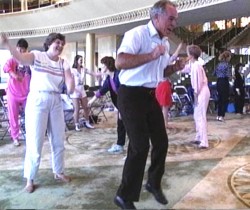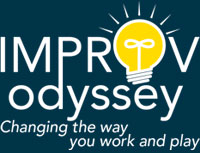Body – Mind – Intuition
“If you can get it out of the head and into the body…Body, Mind, Intuition. This is what we’re after. Body, Mind, Intuition” – Viola Spolin
 The quote above was directed to sixty teachers in a workshop Viola ran and which I assisted. I’ve had the great good fortune to absorb this mantra throughout my long association with Viola Spolin. It is what I instinctively do while sidecoaching. I’ve integrated it so much in my teaching that I don’t even think about it. It is an automatic process. (As it should be when it’s working)
The quote above was directed to sixty teachers in a workshop Viola ran and which I assisted. I’ve had the great good fortune to absorb this mantra throughout my long association with Viola Spolin. It is what I instinctively do while sidecoaching. I’ve integrated it so much in my teaching that I don’t even think about it. It is an automatic process. (As it should be when it’s working)
But my sidecoaching skill came after a long while in the master’s presence. I would like this blog to compress the time it took for me to be a master coach and offer you my experience as a guide. You will still need to acquire the experience through playing, but maybe my journey will light the way and make it less time-consuming.
Body – Mind – Intuition leads to true, spontaneous playing. It often leads to original new work by the players because they are responding intuitively with their whole organism and in that state, authentic, exciting improvisation becomes possible.
To understand the state you want to produce in your players you have to contemplate the game of Tag. It all comes together in Tag.
There is so much information to process in a few seconds of playing tag:
- Seeing where you are in relation to everyone else
- Plotting your path to keep out of the tagger who is “IT”s way
- Readjusting your route constantly as everyone runs away from IT
- Selecting alternate routes among the runners and making choices when to change direction.
- Using your whole body to twist away from IT’s outstretched hand!
- Accepting instantly, (without judgment) your new role once you are tagged.
- Identifying likely targets while running through the crowd – changing instantly when someone gets close.
- Extending yourself physically by running and contorting in either role.
- Laughing, screaming and shouting to others, warning them to get out of the way, while keeping away yourself.
And all this takes place in split seconds throughout the game. You are not making deliberately conscious decisions i.e., using your head. Yet your mind is super active when making these adjustments in the fluidly changing landscape of runners and tagger. Your mind physically directs your body to do what it needs to intuitively because you are fully engaged and physically involved.
The first thing to do is get in your body. (running, tagging). That activates your intuitive mind (split second constant mental assessments and readjustments). Mind and Body meld to make spontaneous choices and keep you playing and in the present.
You are improvising in the truest sense.
How to galvanize your players
Viola understood physicalization is the key to fire things up in a scene.
You can tell when players are in their head by watching how they move or don’t move. A lot of improv is talky and when players are standing around, you can be assured that mostly the head is operating. They are dealing with ideas, verbal offers (telling) and dialogue to generate a scene they want the audience to see but don’t necessarily see it themselves. You’ll also find relationships are thumbnail, not detailed and usually devoid of deep connection. This inevitably leads to minor variations on cliché’ relationships and superficiality covered over by cleverness and novelty. When your players are consciously trying to improvise you will notice a disconnect with the body.
You will of course call “Show us! Don’t tell us!” and sometimes that is enough, but often the head is still in charge and now wonders how to show without telling.[1] It’s up to you to reconnect them with their bodies. Body stimulates the mind. The mind does not usually activate the body.
“Put the emotion in your shoulders!” or “Physicalize what you are seeing!” are great sidecoaching phrases that remind the player to express physically what they feel, think and see.
Once that happens, the body and mind are now unified and opening the intuition becomes possible.
I’ve heard some teachers sidecoach things like “Think about what you are saying.” Or “How does what you hear make you feel?” or “Imagine you are…” Those phrases appeal to the head and more thinking will not usually activate the body.
Anything you can say to bring them back to their body while playing will go a long way to helping them connect to their fellow players and the environment. And once the body is involved, Mind and Body will merge allowing everyone’s intuitive sense to emerge.
When players are playing intuitively, everything becomes possible and new ground may be explored. Be mindful of your coaching and try to coach your players into their bodies before appealing to their mind, imagination, head, whatever you’d like to call it.
So remember that progression as you sidecoach. Body Mind Intuition. That is the combination that unlocks the doorway to the unknown.
[1] I know for myself in my early training my mind was racing to figure out showing. Eventually, I used the where and that got me by, but sometimes I would use a where I didn’t truly see. I relied on my miming ability and showed something to get the scene moving. Viola used to call what I did ‘drawing pictures’ rather than really seeing it.


